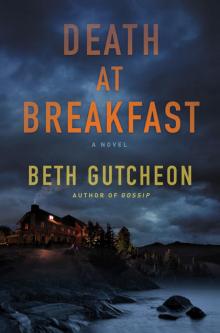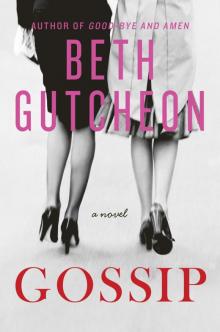- Home
- Beth Gutcheon
Gossip
Gossip Read online
Gossip
Beth Gutcheon
Dedication
For Eden Ross Lipson
Contents
Dedication
Chapter 1
Chapter 2
Chapter 3
Chapter 4
Chapter 5
Chapter 6
Chapter 7
Chapter 8
Chapter 9
Chapter 10
Chapter 11
Chapter 12
Chapter 13
Chapter 14
Chapter 15
Chapter 16
Chapter 17
Acknowledgments
About the Author
Also by Beth Gutcheon
Credits
Copyright
About the Publisher
Chapter 1
You were asking about Dinah Wainwright,” I said to Judy Mellincroft, once we got her bodice basted. Mrs. Oba was on the floor with her mouth full of pins, taking up the hem of a sleek wine-colored evening sheath. Judy is so tiny that we have to reconstruct everything she buys, but it’s worth it. She loves the designers I carry, and she’s out in my clothes every day for lunch and most nights during the season, a walking advertisement for the shop, and I don’t even have to give her a discount.
Having a storefront on Madison Avenue is usually a boon, but that day I could have wished for an appointment-only operation upstairs somewhere off the avenues. We’d had more walk-in traffic in two days than in the prior two years, and everyone who rang the bell tracked muddy slush in along with their curiosity. The sky was heavy and there were huge puddles at the street corners where the grates were still clotted with snow. And inside we felt like animals in the zoo.
I had a beautiful taffeta opera coat in the window, my winter staple. I don’t carry fur anymore, even as trimming—so much has changed since I first opened—but this is one evening coat that is as warm as fur and doesn’t make you look like a stuffed cabbage. However, the gawkers pretending to study it were not thinking of upgrading their wardrobes.
Could we talk about fur for just a minute? When whoever it was wrote of “nature, red in tooth and claw,” he could have been talking about the kind of mayhem an ermine can cause in a henhouse. They kill for pleasure. My father tried keeping chickens for a while. Believe me, the sight of those slack, defenseless feathered bodies lying on the floor of the coop with their throats ripped open while the rest of the flock screams in terror is enough to make a fur wearer out of anybody. Ermine, on clothes, the emblem of kings. You know what it is really, an ermine? A stoat in winter. Their coats change color except for a flick of black at the ends of their tails. They have no intention of eating the chickens; they’re in it for the screaming.
Sorry. The point is, it was a hard day. I had Dinah Wainwright in the back fitting room, trying to give her some privacy, but Judy must have heard her voice. If Dinah’s voice were a color it would be magenta, a warm color as vital as blood, mixed with that dark blue of late evening sky and with something rich and brown, like chocolate. It’s not so much that the voice carries as that it draws you. You want to hear what she’s talking about. In our school days, when you heard a peal of that voice laughing, you wanted to be there, where the fun was.
Nowadays when she laughs there’s a rattle in the undertones, like someone shaking a jar of buttons. Dinah didn’t stop smoking nearly soon enough. A great way to get Dinah to do something was to tell her she shouldn’t do it.
I couldn’t blame Judy for asking. I’d been described in the tabloids as “a friend of the family,” apparently because I’d answered the phones. But if I had minded her asking, I couldn’t have shown it. You don’t keep your customers by being touchy. I probably should have taken Dinah straight upstairs to the workroom, but it happened to be stacked with samples for spring we hadn’t had a chance to sort and price yet.
I don’t think you can really understand this story without knowing how long we all have been in each other’s lives. Dinah and I met in 1960 when we were fifteen, the day we both arrived at boarding school. I was a scholarship student at Miss Pratt’s, which nobody knew. So was Dinah, which everybody knew, because she told them.
My first day at school was indelible, mostly not in a good way. For our classmates, arriving at school was a family affair. They came in station wagons with their parents. On the sidewalk they shrieked greetings to friends. They sang out “man on floor” when someone’s father or brother entered the dorm lugging a trunk, as if they were characters in a cozy British movie like The Belles of St. Trinian’s. I had come alone and was watching the street from the window of the room I’d been assigned, wondering how many days it was until I could go home for Christmas vacation, when behind me that oboe voice said, “You would be Loviah French.”
She even pronounced it right, LOV-i-uh. Dinah was already dressed like the quintessential Miss Pratt’s girl, in a knee-length skirt, charcoal kneesocks, and a shell-pink sweater over her matching blouse. She lounged against the doorjamb, a marvelous creature with huge blue eyes and mad dark hair.
“Lovie,” I said.
Dinah walked in, taking inventory of my suitcase open on the chest at the foot of the bed, at the little framed pictures I’d put out of my parents, my sisters and brother, and my dog.
“Well, I knew you weren’t Sherry Wanamaker,” Dinah said. That, according to the name cards on the outside of our door, was the name of my roommate.
“Do you know her?”
“I don’t know her, but they’re in the papers all the time.”
“They are?”
“I don’t think they are the department store people, but I know they’re all blond. While you are more . . .”
“Mouse-colored,” I said, quoting my mother. My first experience of hearing something I had no intention of saying out loud offering itself to Dinah.
She looked at me with a flicker of special interest.
“I’m Dinah Kittredge,” she said. “I’m from Canaan Hamlet, the village huddled against the famous gates of Canaan Woods. I’m here on scholarship. Where are you from?”
I had no idea what Canaan Woods was. “Maine.”
“The Main Line?”
“The state.”
“I’ve been to Maine. What part?”
“Ellsworth.”
She looked blank. I said, “West of Mount Desert, and east of everything else.”
“And you’re here because it’s where all the best people go?”
“My grandmother went here. I’m named for her. I think my parents expected a different kind of daughter entirely.” I’d done it again, completely lost control of my mouth. And when I saw that it pleased her, I suppose it was inevitable that I’d go on doing it.
“Come see my room,” she said. I left my unpacked clothes and went. She had pictures of her parents and her two sisters in pretty frames on her dresser, and she had brought her own bedspread and had a Kennedy/Johnson campaign poster on her wall. She was, as far as I could tell that fall, the only Democrat in the student body, which bothered her not one whit. We sat together listening to Ella Fitzgerald sing Cole Porter on her record player as the dorm filled up around us.
By the time I went back to my own room, Sherry Wanamaker, blond as advertised, was all settled in, laughing with three upperclassmen she knew from New York. We were never soul mates when we were in school, but Sherry’s been wonderful to me since I opened the shop. She has me dress her daughters, and I did all the clothes for her last wedding.
I had a hard time adjusting to life at Miss Pratt’s. Dinah used to say I was a middle child trapped in the body of a firstborn. I had to do everything first in my family, first to go to kindergarten at The Big School, first to go to sleepaway camp, first to go away to school, and all of it scared me,
usually for good reason. At Miss Pratt’s I could see the minute I looked into the closet I shared with Sherry that my clothes weren’t right—my mother had made most of them. My shoes were generic Oxfords, not the kind with a flap over the laces from Abercrombie & Fitch. My cable-knit sweater was made by machine, not hand-knit in Hong Kong. The color didn’t have that jewel-like intensity of the real ones, and the buttons were flat. I noticed Sherry noticing.
So did Dinah. Dinah saw everything. Her own clothes were real. She may not have had as many as other girls, but her blouses had Peter Pan collars and came from the McMullen shop. She had a cable-knit cardigan in emerald green with matching yarn-covered ball buttons. On Saturday nights when we dressed up, her crisp blue-and-white dress was a Lanz, not a copy. Dinah watched everyone, and somehow she knew exactly what to do, and also saw who got it wrong, and how they handled it. She gathered information. She was at ease with the girls with famous names and all the right connections, and they accepted her—in fact flocked to her—as it began to be known that she could do a flawless imitation of the science teacher’s speech impediment or of the rolling walk of the Latin teacher whose right leg was shorter than her left. But really her secret was that she was at ease, not a small trick when you’re fifteen, and she never pretended to be anything she wasn’t. She was ruthless about those who did.
One autumn morning after breakfast, I was in the dorm bathroom, in one of the stalls, when I heard Sherry Wanamaker talking to someone else about her roommate, Harriet High School. (It was true that I’d gone to public school before coming to Miss Pratt’s.) Mortified, I stayed where I was until the warning bell rang for class and the dorm emptied out, so no one would know that I had overheard. But as I was rushing up the hill to French class, Dinah joined me. She said, “You can’t mind Sherry. She doesn’t know she’s mean.”
It wasn’t at all what I was expecting, and it made me laugh. That was the moment I began to really trust her. Of course Dinah was right; Sherry wasn’t thinking about me, she was just making a friend. A wink, a knowing remark to someone she wanted to be close to, and she established a bond. Even my own dotty mother, with her homemade clothes and disastrous cooking, would occasionally describe someone as “N.O.C.D.” Not our class, dear.
I did wonder how Dinah knew I’d heard. Saw my shoes under the stall door, I suppose. My not-quite-right shoes. Dinah’s protection changed everything about Miss Pratt’s for me.
People like . . . well, like my poor mother with her superiority complex, based on nothing so American as accomplishment, needed walls between them and the people outside the gates. If you weren’t up on the ramparts with your cauldron of boiling oil, full of Harriet High School and Not Our Class, Dear, someone might notice that your shoes weren’t quite right either. But Dinah wasn’t like that. She knew who she was; she lived outside the walls and preferred it. She could go in and out of the gates at will. She could even afford to bring people like me right up to her campfire. What she knew was that soon the most confident and amusing inmates would be outside with us, singing rude songs and telling ghost stories. I never would have made friends myself with all those girls with the famous names, girls with influential parents. Confident girls who made us laugh and would one day invite us to their coming-out parties. I was almost always the quiet one at the outer edge of the circle, but I was welcome to join their reindeer games if I wanted to, and knowing I was under Dinah’s wing meant that girls who might otherwise have looked through me, and even the teachers with famous mean streaks who had seen me as fair game, began to assume I must have some hidden depths. And of course I did. We all do.
Chapter 2
As I came to understand much later, Avis Binney’s social credentials were impeccable. Her father was a partner at the whitest of white shoe law firms and her mother came from one of the Dutch families of old New York; there is a tiny triangular park in lower Manhattan named for one of her direct ancestors and a street in the financial district named for another. At one time there had been in the family a famous estate north of the city, a favorite haunt of the painters of the Hudson River School, but the closest Avis had ever been to it was to visit its vistas in frames hanging at the New-York Historical Society. Perhaps it was that experience, of looking into pictures as if looking out a window from a life that wasn’t hers but might have been, that made art so important to her.
You would have thought that, with her brains and breeding, she’d have been made for Miss Pratt’s and it for her, but you would have been wrong. Miss Pratt’s at mid-century wanted girls to be bubbly, cheerful, and easy to manage. Avis was hard to read, and shy even when she was a senior. To us new girls, her shyness registered as unearned hauteur, perhaps because she was tall and bony and frightened of making social errors; when she wasn’t sure how to react, she often simply remained quiet. This made others suspect snobbery.
Avis was the only child of older parents. Her father, George Binney, had been nearly fifty when she was born; her mother was ten years younger but was still what was known in those days as an elderly primipara. Siblings for Avis were not contemplated. An older friend of mine described Alma Binney as a stern and humorless woman, fond of bridge and club life, who agreed with most of her social set that Franklin Roosevelt was a traitor to his class and family. Avis’s parents were much involved with each other and with their various boards and pastimes. Avis was mostly raised by a thin-lipped Scottish nanny who stayed up all night pacing in panic when the moon was full because it reminded her of bombing raids on bright nights during the Blitz.
Throughout her childhood and youth Avis was far more at ease around adults than children; she understood better what they wanted, and how to please them, than she ever did with her classmates. She knew that among her mother’s friends it was assumed that George Binney would predecease Alma, as husbands tended to do, and that Alma would enjoy a long and decorous widowhood for which she was calmly preparing. Instead, Alma suffered a massive stroke in her sleep when she was forty-nine, and as she herself would have put it, woke up dead. Avis was eight.
Alma had been dead not quite a full year before George married Belinda Ray, a magazine editor and self-described party girl who had come to New York from rural Ohio to attend Barnard College, fallen in love with city life, and stayed. She was as different from Alma as chalk from cheese, fun loving, irreverent, and beautiful. Having never been a mother, she functioned less as a parent to Avis than as an unusual but trustworthy pal. It made a great change in Avis’s life, and after a period of confusion and standoffishness on Avis’s part, which Belinda ignored, they became friends. Even in later years when Belinda had grown rather grand, she was known everywhere as a thoroughly nice woman.
In her own age group at Miss Pratt’s, Avis was respected by most and loved by two or three. The younger girls, however, were less likely to see the point of her. New girls tended to prefer the seniors who were warm and affectionate, or mad, bad, and dangerous to know. Avis understood this and had long since made her peace with it, since her passions were not social. On a grand tour of Europe Avis had discovered Velázquez at the Prado in Madrid, and stood transfixed before first one and then another portrait of Philip IV with his long jaw, swollen lower lip, and sad droopy eyes. The pictures made him so present and human that it made Avis hungry for more; seeing them was like reading the beginning of a story you then couldn’t discover the ending to. She wanted to know how it felt to wear those doublet things, to be never alone, to marry your own niece, to lose that beautiful prince, Carlos Baltazar. She hated it when children died. She had questions for Queen Mariana too, and for the lady-in-waiting, who looked so much like her roommate Cynthia, who was offering the tiny princess a plate of fruit in Las Meninas. Did they all really love the dwarves, or were they afraid of them? Avis was afraid of them. The rest of the group was ready to leave the museum and find some lunch when the tour leader did a head count and had to backtrack through half the galleries to find Avis and haul her off to where she was supposed to be.
/>
When Avis returned to school, the History of Art teacher, one of the best and meanest teachers at Miss Pratt’s, watched her commitment to this new passion first with skepticism, then with an amused pleasure in trying to find its false bottom or trick latches, and finally with admiration. Her classes had inspired scores of girls to major in art history in college and then to while away a year or two in internships at the Met in New York or the MFA in Boston before marriage, but a girl with an actual vocation came along far more rarely. By her senior year, when we first knew her and Avis had taken all the art history courses the school offered, the teacher did something she would normally have considered far above her pay grade; she designed an individual tutorial for Avis on Spanish painters from Pacheco to Sorolla. So Avis got out of taking Domestic Arts or something else she didn’t care about to fill out her schedule.
Nothing, however, could provide her a bolt-hole from the school’s famous social traditions, which had once, in its days as a finishing school, been its most important aspect. Equipping young ladies to converse graciously with companions they had no interest in was still seen as a key aspect of a Miss Pratt’s education. Accordingly, each new girl was assigned a senior girl as her “date” for Saturday nights, a different senior for fall, winter, and spring terms, and yet others for special occasions. These arrangements occasionally led to real friendships, but most often they were regarded with anxious horror by the new girls. The older girls minded the whole business less, as the “dates” mirrored the roles of girls in the outside world, with the seniors playing the boys. The seniors sat with their own friends or roommates while the dates sat glumly by, attempting to fit in. But some seniors, and Avis was one, never got over the discomfort of these forced intimacies. I imagine she may have reacted with inner dismay to the news that her assigned companion for the annual winter Ice Cream Concert was popular, self-assured iconoclastic Dinah Kittredge. Avis’s only contact with Dinah up to then had been her duty as library proctor to ask Dinah and her friends to stop erupting in laughter during study hall.

 The Affliction
The Affliction Dead at Breakfast
Dead at Breakfast Good-bye and Amen
Good-bye and Amen Leeway Cottage
Leeway Cottage Gossip
Gossip Saying Grace
Saying Grace